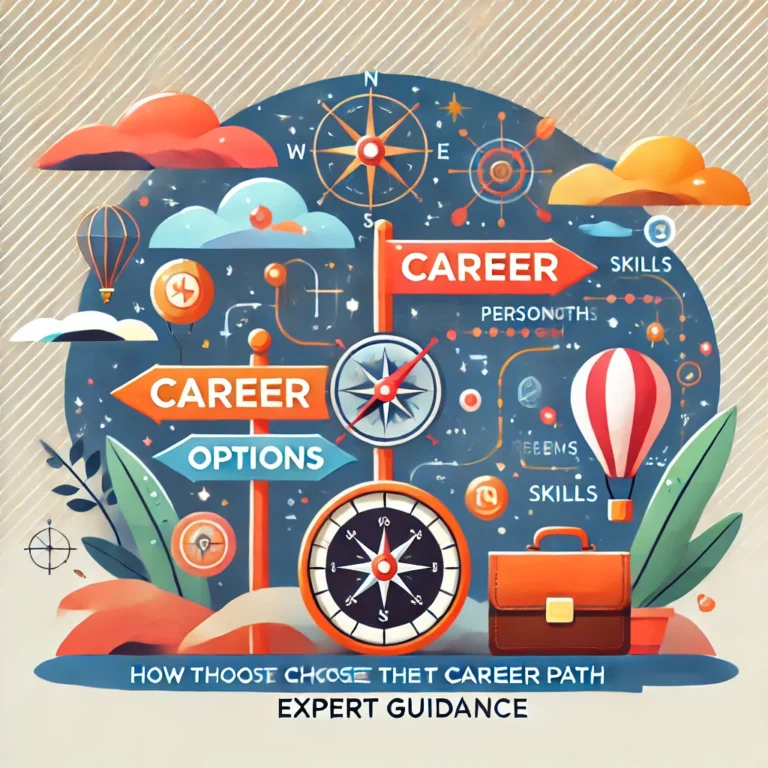The Ultimate Career Guidance Guide: Step-by-Step to Achieving Your Dream Job
Finding the perfect career can feel like chasing a unicorn—it’s elusive, mythical, and sometimes downright frustrating. However, with the right roadmap, achieving your dream job doesn’t have to be as challenging as it seems. This guide will take you through the process step by step, helping you navigate the maze of career choices, preparation, and job applications. So, buckle up, because we’re about to embark on the ultimate journey to career success!
What is a Dream Job, Anyway?
We all have different definitions of a dream job. For some, it’s a high-paying corporate position with a corner office and a view of the skyline. For others, it’s a flexible freelance gig that allows for remote work and creativity. What’s important to note is that your dream job is as unique as you are—it aligns with your passions, skills, and lifestyle. So, before diving in, take a moment to ask yourself: What does my dream job look like?
Step 1: Self-Assessment – Know Thyself
Before sending out resumes or scouring job boards, start by getting to know yourself better. No, this isn’t some philosophical exercise—it’s about understanding your strengths, weaknesses, skills, and interests. Knowing yourself helps guide your career choices.
- Strengths and Weaknesses: Take a moment to list your strengths and weaknesses. Are you a natural leader, or do you prefer working behind the scenes?
- Passions and Interests: What excites you? Whether it’s design, numbers, or working with people, identifying your passions can help narrow down your career options.
- Skills and Experience: What skills do you bring to the table? It’s essential to know where you stand and where you might need improvement.
Step 2: Research, Research, Research
Once you have a clear picture of yourself, it’s time to dive into career research. Think of it like window shopping but for jobs!
- Explore Industries: Don’t limit yourself to one sector. If you’re interested in marketing, explore careers in advertising, public relations, or digital content creation. Love working with numbers? Finance, analytics, or accounting could be a fit.
- Job Descriptions: Look at job listings for positions you might be interested in. This will give you insight into what qualifications are required and what daily tasks might look like.
- Career Prospects: Consider the future. Is this industry growing? Are there ample opportunities for advancement?
Step 3: Set Realistic Career Goals
The next step is goal setting. Remember, no one climbs Mount Everest in a day! Breaking down your career aspirations into smaller, manageable goals can help you stay on track and not get overwhelmed.
- Short-Term Goals: These could include completing relevant certifications, building a portfolio, or applying for internships.
- Long-Term Goals: Think about where you want to be in five to ten years. Do you want to move into a managerial role? Start your own business?
- Milestones: Set achievable milestones along the way. Maybe you want to apply to five jobs each week or network with professionals in your industry.
Step 4: Upskill Yourself
In today’s competitive job market, simply having a degree isn’t always enough. Employers are looking for candidates who have extra skills and can bring more to the table. So, how can you boost your qualifications?
- Online Courses: Platforms like Coursera, Udemy, and LinkedIn Learning offer courses on just about anything, from graphic design to coding to data analysis.
- Certifications: Industry-recognized certifications can set you apart. For example, Google Analytics certifications for digital marketers or PMP for project managers.
- Workshops and Webinars: Keep an eye out for webinars or local workshops that can teach you new techniques or insights about your desired field.
Step 5: Networking – It’s Not What You Know, It’s Who You Know

Networking can often be the secret sauce to landing your dream job. Who you know can sometimes matter more than what you know. But don’t fret—you don’t need to be a social butterfly to network effectively!
- Online Networking: LinkedIn is your best friend here. Join groups related to your industry, participate in discussions, and connect with professionals.
- In-Person Events: Attend conferences, seminars, or career fairs. Don’t be afraid to introduce yourself to professionals in your desired field.
- Informational Interviews: Reach out to people who are working in your dream job. Ask them questions about their career path, challenges, and what it takes to succeed.
Step 6: Perfect Your Resume and Cover Letter
Your resume and cover letter are often the first impressions you make on a potential employer, so you’ve got to nail them. Here’s how to create ones that will stand out:
- Tailor Each Application: Don’t send the same resume and cover letter to every job. Customize them to fit the job description and highlight relevant skills.
- Keywords Matter: Many companies use Applicant Tracking Systems (ATS) that scan for keywords. Make sure your resume includes the skills and qualifications listed in the job description.
- Keep it Concise: Your resume should be no longer than one page unless you have years of experience. Highlight your most significant achievements.
Step 7: Nail the Interview
Great! You’ve landed an interview—now it’s time to shine. The interview can make or break your chances, so preparation is key.
- Research the Company: Know the company’s values, culture, and recent achievements. This shows you’re serious and have done your homework.
- Practice Common Questions: Practice answering common interview questions like “Tell me about yourself” or “Why do you want to work here?”
- Dress the Part: Even if the company is casual, dress professionally for your interview. First impressions matter.
Step 8: Be Persistent, But Patient
Job hunting can be stressful, and it’s easy to get discouraged if things don’t happen as quickly as you’d like. Stay persistent, but also remember that finding your dream job can take time.
- Follow Up: After each interview, send a polite thank-you email to show appreciation for the opportunity.
- Stay Positive: Every rejection is an opportunity to learn and improve. Don’t let it get you down!
Step 9: Accepting the Offer – But Read the Fine Print
Congratulations! You’ve finally received an offer. Before jumping in, make sure to carefully evaluate it.
- Salary: Is the salary in line with industry standards and your experience?
- Benefits: What’s the health insurance, retirement plan, or vacation policy like?
- Growth Opportunities: Does the company provide opportunities for training and promotion?
Step 10: Keep Learning and Growing
Even after landing your dream job, don’t get too comfortable. The best professionals continuously seek to learn and grow in their careers.
- Stay Updated: Subscribe to industry newsletters or blogs, attend conferences, and keep up with new developments.
- Seek Mentorship: Find a mentor who can guide you as you progress in your career.
- Don’t Settle: If at any point you feel like you’re stagnating, it may be time to reassess your goals and make a change.
Conclusion
Finding and landing your dream job isn’t an overnight process, but with patience, persistence, and the right strategy, it’s absolutely achievable. Remember, your dream job is more than just a paycheck—it’s about finding fulfillment in your work and aligning your career with your life goals. So, take it step by step, and before you know it, you’ll be walking into the office (or home office) of your dreams!
FAQs
1. How long does it take to find a dream job?
The timeline varies for everyone. For some, it can take months, while others may find their dream job in a matter of weeks. Stay persistent!
2. Can I have more than one dream job?
Absolutely! Many people have multiple career passions. You can explore different fields or find a job that combines several of your interests.
3. Do I need a college degree to get my dream job?
Not always. While some careers require formal education, many industries now value skills, certifications, and experience just as much.
4. How important is networking in finding a job?
Very important. Networking can open doors to job opportunities that might not even be advertised online.
5. What if I don’t know what my dream job is?
That’s okay! Start by exploring your passions and interests. It’s perfectly normal to take time to discover what career path suits you best.







